- Home
- Peter Carey
The Chemistry of Tears Page 16
The Chemistry of Tears Read online
Page 16
During his first week at Thigpen & Co., despite the demands of his pre-set lathe (which he boasted he had mastered while complaining of its danger), Sumper seems to have been a most effective spy.
The draughting tables had been set to one side of the altar, and here, in the place where the choir stalls would normally be, he had glimpsed the large stooped Thigpen and his senior mechanics poring over plans.
He learned that only the firm’s most respected tradesmen served the engine and that there were still ten thousand more individual parts to be produced. Not one of these ten thousand could be commenced until a very detailed drawing had been made, and as each new drawing was examined, great discussions (and some fierce arguments) took place. He was able to make me see this in a rather comic way, as if the engine was an Idol and the men were its demonic votaries.
“They thought they were all great fellows,” Sumper told me, “but not one of them, not even Thigpen, knew that the machine was at imminent risk of being broken down and sold for scrap.”
Of course he couldn’t have known it either. He knew less than anyone and had been astonished to see the tramp shake Herr Thigpen’s hand and to realize that the “placard” was a draughtsman’s folio from which drawings were extracted, reverently, one by one.
An Englishman would likely have deduced that the old man was the designer of the machine, and probably rather grand, but Sumper had assumed the tramp was selling stolen goods.
So it is to be a foreigner.
For Sumper in England, the situation seems worse than mine in Germany—the English workers were allegedly angry he had agreed to man the pre-set lathe. He may (or may not) have been physically attacked outside his own boarding house. He may (or may not) have made cat’s meat of them as he claimed. He was a boastful bragging man but it would fit his character for him to be bewitched by the sight of the dignitaries who visited the draughting table—“wigs of ivory,” he said, “coats like jewels.”
His own work was possibly boring, requiring “less brain than a cuckoo clock.” As a result of that inattention which is the constant companion of tedium, he twice came close to amputation, and it was after the second of these near misses—just when he knew he must find another job—that the factory whistle blew three times. Thank God, he thought, but the day was not over yet.
There were always a great number of trolleys and steel tables trundling across the dark slate floor, and it was one of these that the men, walking in disorderly procession, like cows at milking time, now followed deeper into the factory.
They were preceded by that grey-haired giant, their master. When he had his mechanics gathered about him, old Thigpen removed a dust cloth from the trolley and there revealed a brass and steel device. He spoke. Sumper’s translation was that the device was “the seed of the great idea we serve.” This is consistent with what follows.
Sumper compared the device to an abacus. I wrote this down.
“It was not like an abacus at all,” Sumper told me later. “You will miss the point if you go on like this.” Tiresome man. He also said that the machine was precise, ingenious, and strange. It was an automaton whose purpose was addition.
Then the “tramp” spoke. His voice was deep and mellifluous. No Englishman would be surprised to learn he was the third son of the Duke of Cumbria. He said: “Men, I am to show you an impossibility.”
The fierce little tradesmen were like greyhounds straining on their leash. They pushed insistently towards the heart of the device—two brass wheels engraved with numerals.
Cruickshank asked Mr. Thigpen to set the first of these brass wheels so the number 2 was aligned with the V-shaped cleft. He told the men that the value of this wheel would now be added to the value of the second.
The mechanics’ bodies were sour with weariness and sweat but they pushed against each other, nosing forward, watching closely as a volunteer turned the crank through one rotation.
And what did they see? Why, that 2 + 0 = 2.
That was the great idea they served? The tramp was certainly not embarrassed. He called each worker to turn the handle. One after the other. They were employees. They had no choice. One by one they came. They turned the first wheel (2) and added it to the increasing value of the second wheel.
And the great machine performed no better than a schoolboy.
2 + 2 = 4
2 + 4 = 6
2 + 6 = 8
2 + 8 = 10
Cruickshank greeted each answer with ridiculous astonishment. The men became sullen and resistant, slower and slower to answer their names. It was an insubordinate dye-maker named “Spud” Coutts who added the number 2 to the number 102.
The answer was 171.
Someone dared a cat-call. Herr Thigpen scowled.
Cruickshank clapped his hands together and cried, “Huzza.”
And Sumper smiled with pleasure.
“Only as a child smiles,” he told me, “with no understanding of anything. Of course the Genius noticed me. I was the largest man in the room, and the only one not scowling at him.”
It is not known what Cruickshank had previously told Thigpen or how Cruickshank expected his demonstration to be understood, but if it was intended to lift morale it was a failure. The owner of the works stormed to his office.
“This,” said Cruickshank, as the master’s door was heard to slam. “This is what we should call a miracle.”
There was uneasy laughter.
“What you have all witnessed,” Cruickshank said, smiling, “must appear to be a violation of the law of adding two. It must seem unnatural to you, even to your master.”
At the word “master,” by design or accident, Thigpen blew the whistle. A moment later the men were swarming towards the door, leaving a few uncertain fellows hesitating.
“I am not your master,” Cruickshank coaxed, “but I am the programmer. If you leave now you will never know that I programmed the machine so that after fifty-one additions it would perform the miracle I programmed—after fifty-one additions it would do something discontinuous.”
The word “miracle” had a violent physical effect on one of the remaining workers. He spat, shook his fist, and headed for the door.
“And for me, Jim, that is not a violation of law. It is a manifestation of higher law, known to me, but not to you, Fred.”
But it was hopeless. He could not hold them.
“You expect two plus 102 to equal 104, but I wrote a new law that 102 plus two would equal 171. As a result,” Cruickshank told his sole remaining listener, “as a result of a decision beyond your knowledge, a certain lever clicked into place. You saw two plus 102 equals 171. In nature this is what we call a miracle and I, who predicted it, would be called a prophet.”
Thus the Genius confirmed that Furtwangen’s ideas of God were puny and pathetic, that there were mechanisms beyond human knowledge, that there might be, within our sight but beyond our ken, systems we could never know, worlds we had seen and forgotten. There, in Bowling Green Lane, Sumper recalled thoughts he had had as a child when he wished with all his being that he could know what it was to be the dragonfly in all three stages, as a grub beneath the soil, as an animal living in the water, as an insect flying in the air. Would the dragonfly in its last stage have any memory of its experience of the first? Might he be a dragonfly at last, and if so how would he understand the world? “Mysterium Tremendum,” he told me. The awe and wonder of the universe. Not for a moment did he doubt that Cruickshank was a Genius, perhaps even a Superior Being with a completely different nature. Why not? We believe Jesus walked upon the water.
“We are arrogant in our ignorance,” said the arrogant clockmaker, with his alarming eyes glittering in the firelight in Furtwangen. “If animals possessed senses of a different nature from our own, how would we know? Those creatures, despised by us, might have sources of information we cannot dream exist. They might have a bodily and intellectual existence far higher than our own, why not, why not my Englishman? In London I was tw
enty-eight years old,” said Sumper, “and I was drunk with ideas like this, some of which I had carried in secret like pebbles in my pocket since my childhood. So when the Genius met my eye, he saw I wished to serve, and when the fuss was over in the works, he asked me to walk with him to the west side of Soho Square where he made his home.”
I WAS PERCY’S ENGINE, his pulse, his voltaic coil. With the ink of my pen I nourished him, describing the manufacture of an automaton I had never seen. Thus were my days spent. My nights, on the other hand, were quite impossible, for nothing would stop Sumper talking. Carl and his mother escaped to their bed. Then it was the worse for me. I was swallowed, buried. The drifts of snow built up to the deep sills.
Sumper claimed to have been “born” with the opening of Cruickshank’s front door. Here, in Soho Square, he would soon come to “completely understand” the Cruickshank Engine. He claimed this, glaring at me. He had proof. That is, he had been able to give a “very practical but not theoretical” report of the invention to Prince Albert.
His huge horse eyes demanded some response. What could one say? It was not only a lie, but completely beyond all possibility. Herr Saxe-Coburg, as the pater had had good reason to know, had a character remote and isolated in the extreme. He could not even see a man like Sumper.
Yes, it might seem unlikely, the clockmaker finally admitted, but it had “precisely the same degree of probability” as a foreign saw miller’s son walking in the company of the Honourable Albert Cruickshank. “Eh, Henry? Eh.”
There was a deep order in the world he entered at the top of Cruickshank’s stairs. The worshipper continued, speaking nonsense like a convert to a Baptist sect. Trapped in Germany, I watched him stride up to the tiled stove and around the table, and it soon became clear to me that what he so excitably described as “deep order” was a True Believer’s attempt to give meaning to a mess—children’s toys, oriental figurines, turned brass implements, fragments of marble and a huge library of books in front of almost every one of which was placed some curiosity or object, each one of which beckoned one’s attention.
In the centre of the old man’s solar system there was, allegedly, a large vitrine which housed silver automata, two ladies which Cruickshank frankly confessed he had loved since his childhood. They were both naked, alive and not alive, gleaming silver, thirteen inches high.
Cruickshank set the silver ladies going.
“Extraordinary,” I said.
“You do not understand.”
What I could not grasp, apparently, was that Albert Cruickshank was a Genius. And this Genius knew that Sumper understood him better than anyone ever born. This was all the more remarkable because he was a saw miller with no education.
The silver lady examined young Sumper with her eyeglasses—could she see the huge oafish body with its coarse and musty coverings, the enormous hands clasped across a secret pittering heart? When she had finished she returned to her companion. This second lady was a dancer. On her hand there sat a silver bird. While its mistress wiggled it wagged its tail and flapped its wings.
I told Sumper he was exceedingly fortunate. I said a man could live in London all his life and never see such things.
I don’t know why I said this. It was not true.
He became excited. He related how he had followed Cruickshank down a narrow staircase where there was a workshop growing “like a shelf fungus” against his house.
The sanctus sanctorum was cold, but filled with wonderful lathes and drills and presses and, to one side, a large drawing table where he produced the plans he brought to Bowling Green Lane.
Cruickshank tried to hire him there and then.
But Sumper was unworthy. He was not a vise and lathe man. He had no maths or calculus at all.
“But you laughed,” insisted Cruickshank. “QED. You are my man.”
“I gave only the impression I had understood. All I did was smile.”
“Indeed.”
But anyone could see, Sumper told me, that a clever man would not have added 2 + 2 without good reason. 2 + 2 was predictable. He had smiled, because he had been waiting to see what the surprise would be. Of course he knew 171 was “wrong” but also he assumed it must be right. All he knew was: he who makes the programme is the god.
“One hundred per cent correct,” said Cruickshank. “Here is what I want from you: just shape the wood patterns from which the engine’s bronze cams will then be cast.”
“But you don’t need me for such a thing. It is a skill possessed by every common cuckoo clockmaker.”
“Then have a drink because I have my man.”
Sumper smiled. The Genius offered him a penny for his thoughts.
“I will tell you, Herr Brandling,” said Sumper. “I will tell you what I could never say to him. I was thinking I had arrived at my soul’s true home.”
Who would not envy him?
ALL MY LIFE, it has been assumed I was a dunderhead who would not understand, for instance, why his wife had moved her room.
Hence Sumper: Henry, you could not understand.
At the same time he was determined to test me out.
“The thing is, Herr Brandling, I had been peacefully asleep in bed.”
Not a squeak from me.
“I’ll wager you will not conceive what happened next?”
“Rather not, old chap.”
“I was being murdered.”
Clearly this was not true.
“No, no. A weeping man had fallen on me,” he declared, “like a monkey from the rafter. He bawled and struck me.”
It had been the middle of the night when the Superior Being, now in his nightgown, had thrown himself at Sumper, howling and striking at the sleeping man’s big face. Sumper’s first response had been characteristically violent, but his second thought was less expected—he took the old man in his arms and held him until he went to sleep.
Dear Pater, I thought. The horrors of old men in the night.
When dawn came, the employer had departed. Sumper dressed and descended to the breakfast table. And there was Cruickshank, reading from The Times, undamaged except for a scratch on his high and hawkish nose.
“I was no doctor,” Sumper said. This did not prevent him diagnosing palsy.
In the months ahead, apparently, he decided that Cruickshank’s condition was not attached to Cruickshank but was, in a sense, Cruickshank himself. Cruickshank was the terror. He had moulded his body around the terror’s shape, deepened his own eyes, straightened his own mouth, set his jaw like steel.
Further, Sumper concluded, showing an unattractive astonishment at his own intelligence, the very trauma that brought Cruickshank each night flailing and wailing to the room upstairs, this same pain had also formed the Cruickshank Engine. The Engine and the Madness were the same, he said.
“Cruickshank’s family—his wife, two girls and a baby boy—had been lost at sea. You see that don’t you?”
I’m afraid I yawned. I did not mean to. Against my will I learned that the shipwreck had been solely the result of poor Admiralty charts. The Captain would have sworn on those tables as on a Bible but they led him to the rocks.
Mr. Cruickshank was a Genius, he shouted. He sought RATIONAL EXPLANATION for the cause of tragedy and he, Cruickshank himself, had personally examined the Admiralty tables and he had found them RIDDLED WITH HUMAN ERROR. It was unbearable that his family had been dashed and drowned not by fate or God or nature, but BY MISTAKE. Was I listening? These numeric errors haunted poor Cruickshank’s mind like angry bees, and for many months, while still in mourning, he had sat at his desk with his pencil in his hand and, slowly, carefully, corrected the errors in all their sickening multitudes. Perhaps he imagined that, as a result of these tedious labours, the dead would soon walk, the fire in the stove would light and the kitchen fill with the smell of Yorkshire pudding.
He notified “the ministry” of the miscalculations and the ministry printed errata sheets and these were sent out to the navy and t
he merchant fleet. But then, to Cruickshank’s horror, he found human error re-enter the charts as relentlessly as water through a leaking roof—many of the errata slips had been copied incorrectly. In 140 volumes of tables he found around 3,700 errata sheets that were as wrong as the errors they supposedly corrected. These astronomical tables were calculated by men with celluloid eyeshades who gloried in such titles as Computer or Chief Computer or Computer’s Boy. Their penmanship was such a wonder you might imagine it produced by lathe. Alas, they were simple clerks, with holes in their socks and onion on their breath, being so thoroughly human that they were unsuited to reliably repeating a simple action like addition.
As a result there were noxious errors in transcription, which spread without relent in the ground between the calculation and the printer, and then there were slip-ups in the typesetting, a cloud of them like locusts, and blunders of proofreading as numerous as grains of sand, each microscopic inaccuracy an Isle of Scylla, sufficient to cleave an oaken hull, and no matter how many nights the bereaved man occupied himself with the most menial arithmetic, the mistakes continued.
As a result of this obsession, according to Sumper, Cruickshank became ill. During his illness, or after his illness, certainly as a result of his illness, he began to consider how he would replace the pulp and fibre of the human brain with brass and steel, not some “gilded folly like Vaucanson’s which served only to amuse the rich and mindless.” Cruickshank removed all “lethal sloppiness” from his machine. Those were his exact words, said Sumper.
Cruickshank had previously kept sketchbooks of birds, and nature scenes, no beetle was too lowly for his interest. That is, his eyes had keenly sought to know and understand the natural world. But now all that bright curiosity turned inwards and his eyes, as often as not, rested on his shoes as he sought to invent a steam-driven automaton which would provide navigation charts without a single error. The engine would accept the numbers that were entered and then it would repeat additions to ten places. The machine would add and add and add, like the most dogged human, but without our species’ relentless tendency to error. And the results of these calculations would be kept from the murderous hands of human beings. The machine would produce the correct number and from these numbers it would set the type WITHOUT HUMAN INTERFERENCE and from the type it would make a mould and from the mould it would pour a printing plate which would WITHOUT HUMAN INTERFERENCE print the tables. He planned all this inside the grieving cavern of his mind, with equations going that way, and axles turning, cams moving in and out, levers interrupting and releasing, and calculating to seven orders of difference and thirty decimal places so every number was thirty to thirty-one digits long.

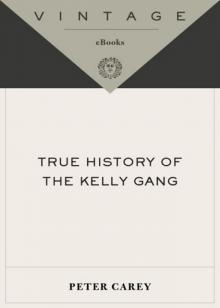 True History of the Kelly Gang
True History of the Kelly Gang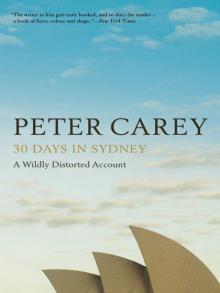 30 Days in Sydney: A Wildly Distorted Account
30 Days in Sydney: A Wildly Distorted Account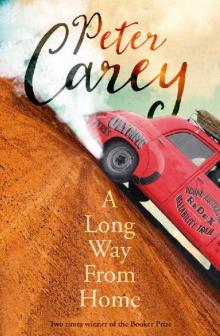 A Long Way From Home
A Long Way From Home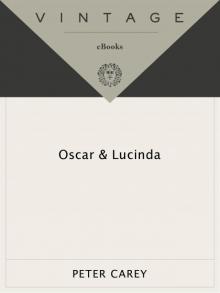 Oscar and Lucinda
Oscar and Lucinda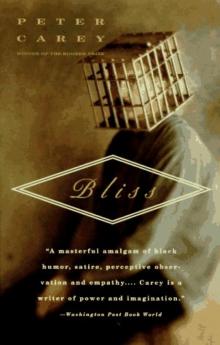 Bliss
Bliss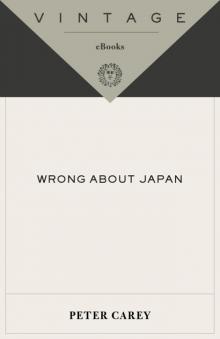 Wrong About Japan
Wrong About Japan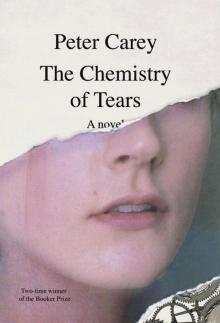 The Chemistry of Tears
The Chemistry of Tears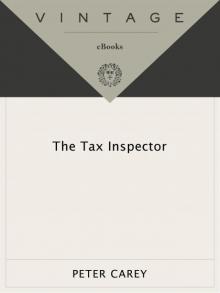 The Tax Inspector
The Tax Inspector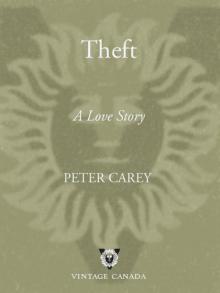 Theft: A Love Story
Theft: A Love Story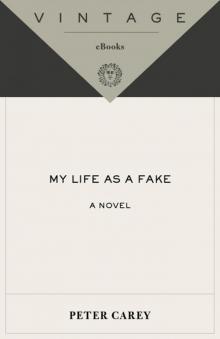 My Life as a Fake
My Life as a Fake Collected Stories
Collected Stories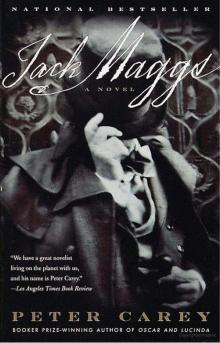 Jack Maggs
Jack Maggs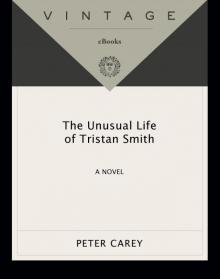 The Unusual Life of Tristan Smith
The Unusual Life of Tristan Smith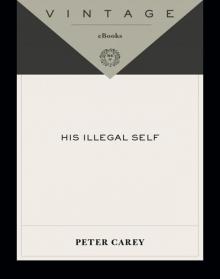 His Illegal Self His Illegal Self His Illegal Self
His Illegal Self His Illegal Self His Illegal Self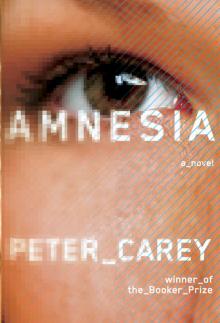 Amnesia: A Novel
Amnesia: A Novel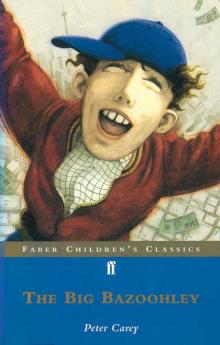 The Big Bazoohley
The Big Bazoohley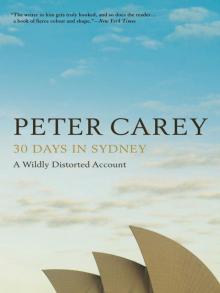 30 Days in Sydney
30 Days in Sydney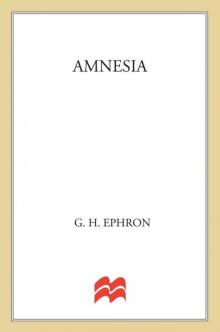 Amnesia
Amnesia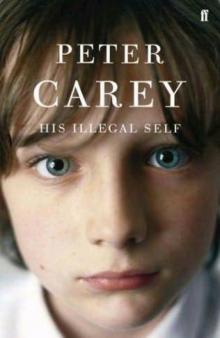 His Illegal Self
His Illegal Self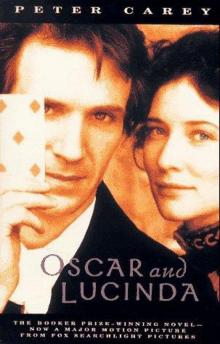 Oscar and Lucinda bw-1988
Oscar and Lucinda bw-1988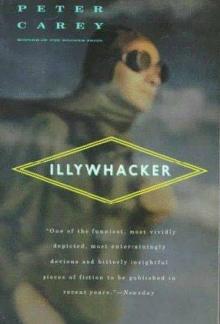 Illywhacker
Illywhacker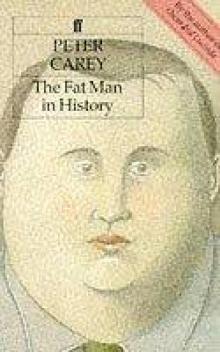 The Fat Man in History aka Exotic Pleasures
The Fat Man in History aka Exotic Pleasures